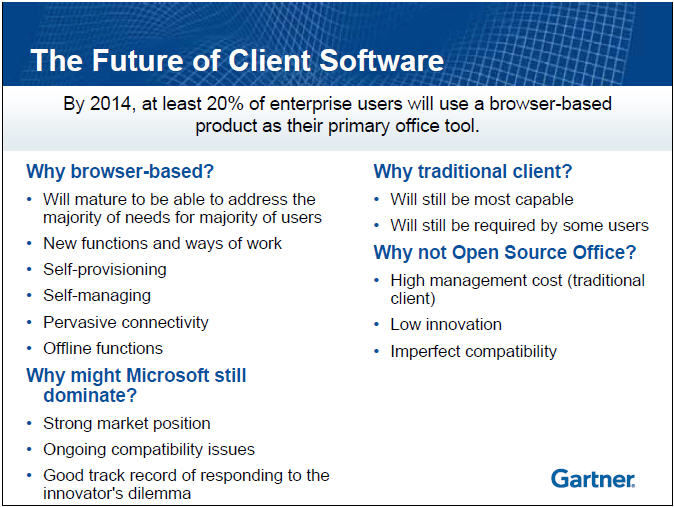Looking beyond Windows 7 and Office; Pondering the alternatives

Gartner is telling customers to upgrade to Windows 7 and the latest Office, but adds that it may make sense to at least ponder the alternatives and move toward a more operating system neutral stance.
In a talk at the Gartner IT Symposium in Orlando, Gartner analyst Michael Silver rehashed much of what the research firm revealed last week. See: Gartner: Windows 7 is 'all but inevitable'
However, Silver seemed to advocate that customers at least ponder a more mixed source environment. For instance, an enterprise can have Microsoft Office but use Google Docs or OpenOffice.org as a supplement to lower overall costs. Ditto for operating systems, but the cost equation is a little more difficult. The big elephant in the room: Will operating systems even matter in the future?
Silver notes that most applications in an enterprise will still need Windows well beyond 2011 so the appeal of the Mac OS and Linux have limited appeal. Virtualization is changing that equation somewhat, but the costs can be higher with alternative operating systems when support if factored in. Silver says that Macs will enter the enterprise through the back door, but it's unlikely that a company will standardize on the Mac OS.
The other issue is the question of the operating system's importance. By 2014, 20 percent of users will primarily use a browser-based product as their primary office tool.
Consider:
As for alternative office software, Web-based alternatives aren't going to be mature enough to replace Microsoft Office until 2014. But these alternatives can be a tool to lower costs.
Silver writes:
There have been many organizations that have investigated moving off Microsoft Office, usually to a distribution of OpenOffice.org (including the free download, Sun's StarOffice, Novell Edition and IBM Symphony), but relatively few have actually made the migration. Impediments include switching costs, issues with macros, stationery, databases and mail clients. For better or worse, for the past 15 years, organizations have chosen to overprovision and deploy a product that can do everything the most-advanced user requires to every user for the sake of homogeneity. Organizations that want to deploy OpenOffice.org (OO.o) need to come to terms with the fact that some users will still require MS Office and they will be forced to support a mix of products.
To Gartner, it makes sense to take advantage of viable perpetual licenses for Microsoft Office for as long as possible. The expensive product you already own will be cheaper than the cheap or "free" product you need to spend money to which to migrate.
